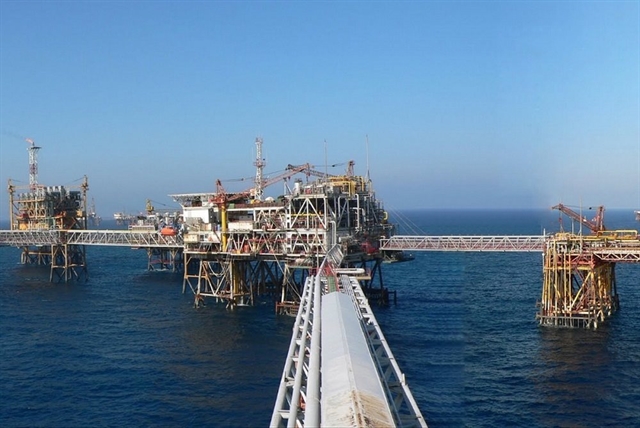According to forecasts by global firms and US analysts, crude oil prices would likely increase in June or July 2020.

Oil may reach its lowest price in history this week but its impacts on the world economy and Viet Nam have been limited at this time when the COVID-19 pandemic is keeping people at home and transportation has been cut off.
Nobody could have thought that crude oil would plunge into negative territory meaning sellers had to pay buyers to take deliveries. The first West Texas Intermediate (WTI) crude to be delivered in May fell into negative pricing of US$37.63 per barrel on Monday.
As the May contract expired at Tuesday's close, market insiders said buyers were shying away due to fears of limited storage capacity amid the rising glut of crude.
According to the Vietnam National Oil and Gas Group (Petrovietnam), such action was peculiar at a special time and did not reflect the actual oil price.
"The negative price was only the price traded between traders on the trading floor rather than the transaction price between the crude oil producer and the end user (refinery). The number of contracts traded below zero US dollars was very low," it said.
According to forecasts by global firms and US analysts, crude oil prices would likely increase in June or July 2020.
On Tuesday, the price of US light sweet oil to be delivered in June 2020 on the New York Mercantile Exchange remained at around $16-20 per barrel, and Brent crude, which is a more relevant benchmark for Viet Nam, was traded at $21-25 per barrel on the Intercontinental Exchange (London).
Admitting steep declines in oil prices would impact domestic production and consumption, but head of the General Statistics Office Nguyen Bich Lam said consumers would be unable to gain from historic low oil prices at this time.
While the COVID-19 pandemic takes its toll on the global economy, destroying all economic activities, it would take a long time for demand for oil and petrol to recover, Lam said, noting that low oil prices would not stimulate production and consumption at this time, and not affect economic growth this year.
"The sharp reduction of oil prices will only have a deep impact when the economy is in a stable condition," Lam told Vietnam News Agency.
At present, the significance of the oil price reduction could be seen in controlling inflation as spending on oil and gasoline for production, transportation and electricity production remained huge.
"The drop in gasoline prices is an important factor that caused the CPI in February, March and April to drop, helping lower the average CPI in the first four months of 2020. This enables the economy to keep the inflation rate below the national target of 4 per cent," Lam said.
Oil companies lose money
The oil slump, however, will adversely impact revenue for PetroVietnam and the State budget.
The State-owned energy group said that falling oil prices since the beginning of this year had affected revenue and the efficiency of its subsidiaries in all areas.
For oil and gas exploitation, if oil prices dropped by $1 per barrel, revenue would fall by about VND2.2 trillion ($94.4 million) a year. So at a price of $30 per barrel, revenue would decrease by about VND55 trillion this year (compared to the planned price of $60).
Petroleum production and trading activities were also being negatively affected. Oil refineries were suffering losses due to storage, low product price differences (sometimes gasoline is lower than oil) and the risk of stopping operations due to high inventories.
Contributions to the State budget may also decrease by VND18.6 trillion ($798.2 million) per year, it said.
Meanwhile, as crude oil prices continued to slide, many experts have suggested importing oil to save national resources and avoid buying at high prices.
According to a representative from the Viet Nam Energy Association, it would soon submit a proposal to the Ministry of Industry and Trade for importing petroleum at low prices in a bid to facilitate the economy's fast recovery after the pandemic.
Though purchasing crude oil for stockpiling was a reasonable direction that could bring opportunities to the country, PetroVietnam pointed out some obstacles such as the lack of a risk control mechanism and limited storage infrastructure (currently there are only two oil depots at the Dung Quat and Nghi Son refineries).
Nguyen Viet Son, director of the Oil, Gas and Coal Department under the Ministry of Industry and Trade, said the ministry had directed the entire oil and gas industry to immediately build comprehensive solutions to promptly respond to the worst scenario in oil prices in 2020.
It asked PetroVietnam to review its overall plan for oil and gas exploitation and production to determine a reasonable oil price level and to make decisions on the continuation or suspension of low-output wells. It was also instructed to revise a new mine development plan to ensure enough reserves to be ready for the market when oil prices rise.
At the same time, the Ministry of Industry and Trade has reported to the Prime Minister and proposed solutions to support the industry during this period. — VNS





